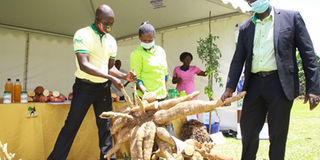Ugandan products rejected abroad – Naro

The director of Naro, Dr Hillary Agaba (right) and the director of Research at Mukono Zonal Agricultural Research and Development Institute, Dr Barbara Zawedde (centre) show some of the cassava at the weekend. PHOTO/RACHEL MABALA
What you need to know:
- Aflatoxins have mainly contaminated Uganda's food products.
Officials from the National Agricultural Research Organisation (Naro) have said Ugandan products are being rejected in the East African region because they contain aflatoxins, dangerous substances that cause cancer if consumed in large quantities.
Dr Barbara Zawedde, the director of research at the Mukono Zonal Agricultural Research and Development Institute , told Daily Monitor at the sidelines of the World Food Day celebrations at the weekend that aflatoxins have mainly contaminated food products.
Dr Zawedde said flatoxins are a result of poor handling of grains and food stuff, from the garden throughout the storage process and transportation.
She said some of the food being rejected includes maize, beans and groundnuts, warning that if farmers are not educated to store, transport and
practice better farming methods, they will lose out .
“Farmers should understand that they need to manage food well because it poses a risk to people’s lives,” Dr Zawedde said.
She said if crops are exposed to pests and diseases when they are still in the garden, they can easily get contaminated by aflatoxin substances.
Experts say aflatoxins are produced by certain moulds which grow in the soil, decaying vegetation, and grains.
They can cause acute hepatic toxicity, chronic disease such as liver cancer, haemorrhages, and immediate death.
Scientists at Naro have also vowed to carry on with research on improved crops to meet wider food demand among the growing population.
Dr Moses Biruma, the acting director of research at National Semi Arid Resources Research Institute Uganda (NaSARRi), said annual research is needed to meet the fast growing world population.
“Once we sit back, there will be a tremendous shortfall in food globally. We need innovation in research to sustain food demand,” Mr Biruma said last Friday.
He added that Naro will continue to generate technologies that can be able to serve the interest of everybody both in drylands and wetlands within and outside the country.
Ms Florence Oumo, a retired agronomical technician at NaSARRI, now minister for agriculture in Iteso Cultural Union , said Naro should take its technology to communities, adding that some are not conversant with developments in other agricultural institutions.
“I am proud to associate myself with NaSARRi having worked here, but you should partner with cultural institutions on food security,” she said.
Meanwhile, Mr Fred Bamwine, the Mukono Resident District Commissioner, has called for bylaws to ensure all families own gardens.
He said during the lockdown, families that had gardens were not badly affected like the ones that had none.
“Each household can possess a family garden even those with a small piece of land. They can practice urban farming. In my constituency, each household has a garden and this must be emphasised by all local governments,” Mr Bamwine said.
Solution
Dr Hilary Agaba, the director of Naro, told farmers that they will conduct research on the matter and hold talks with Kenya after an incident where Ugandan products were rejected.Dr Agaba said Naro has created new products that mature very fast and bring high yields.
They include cassava, sweet potatoes, bananas and agro-forestry, including various tree species that can produce poles for electricity and timbers.


